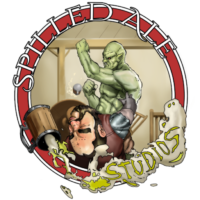The second in a series of articles highlighting Spilled Ale Studios’ own setting which is currently in development, this post looks at how One For All handles classes and character powers.
See also: Part 1: The World and its People
Classes
At its core, One For All is powered by the rules in 5e’s SRD. But there have been significant changes to many parts of the game to build a system that best captures the world of One For All.
One such change is a significant alteration to the class structure of the game. Classes no longer represent very specific types of characters such as fighters, clerics, or monks, but rather three broad archetypes. In One For All a character is either a Magus, a Rogue, or a Warrior. The classes are deliberately generic, but the player has plenty of opportunity to make their character special through their choices at every level. In short the player chooses what makes their character special, it isn’t dictated by the class subsystem. Or, just as likely, they are multiclassed between two or even all three of these classes. Multiclassing is completely unrestricted and there are even some benefits to doing so. One For All encourages you to build exactly the character you want to play.
Also playing into this design goal are the level-based benefits of each class. Whether you play a Magus, a Rogue, or a Warrior, your rewards at each level are the same: at odd levels, you receive a talent. At even levels, a bonus feat. This progression will be familiar to anyone who has played D20 Modern.
So how do the classes differ? Each class offers different benefits when selected at first level. Beyond that, the main differences between the classes are what feats a character may select when they earn a bonus level during a level up in that class, and which talent trees the character has access to when they earn a talent. Additionally, while multiclassing is easy and encouraged, there are also rewards for dedication to a single path. Each class is associated with a number of prestige talent trees, which are only accessible when a character has a certain number of levels in one or more classes (among other prerequisites).
Magus
A magus is a hero who practices a magical art. Characters that other games might divide up into categories such as Clerics, Druids, and Wizards are all Magi in One For All. While there are differences in the beliefs and practices of various spellcasters in the world, all their magic works the same way.
Any character can gain access to the magic subsystem via the selection of the appropriate feats, but a character that picks magus at 1st level gets these feats for free up front, and has an initial boost in magical power.
Rogue
A rogue is a hero who relies on skills and knacks. Rogue is a well-rounded class that can be built as stealthy thieves, agile catburglars, shadowy assassins, charming scoundrels, or keen-eyed scouts.
Apart from immediate access to the roguish talents, a character that picks rogue at 1st level gets a choice of feats which, depending on your selection, can improve the character’s skill set, mobility, or deadliness.
Warrior
A warrior is a hero whose talents lie on the field of battle. Deadly duelists or professional soldiers, warriors are deadly combatants with a talent for surviving combat.
Apart from immediate access to the warrior talents, a character that picks warrior at 1st level gets the best immediate access to weapon and armour proficiencies.
Feats and Talents
A feat may have prerequisites, but it is never restricted from a character based on their class or faction affiliations. Theoretically, almost all characters from any of the three classes can select any feat as long as they can qualify for its other prerequisites. Each class does offer a restricted list of feats that members of that class can select when they level up in the class, but characters aren’t restricted to any list using their level-based feat slots.
Talents are slightly more potent than feats, and usually more restricted. To earn a talent from any of the talent trees in the Rogue class, the character must gain an odd level in Rogue. The same goes for talents associated with the Warrior class and prestige talents with the Magus class.
There are also three other types of talent: General, Magic, and Faction. Talents in a general talent tree can be selected by a member of any class. Talents in a magic talent tree can be selected by anyone who has unlocked access to the magic subsystem (these are the go-to talents for any Magus, but other characters can unlock them too with a little effort). Finally, faction talents are available only to characters who are affiliated with the faction in question. Affiliation with a faction can be established at character creation, or else earned in-game.
Magic, Rituals, and Maneuvers
Any character can eventually gain access to the magic subsystem by purchasing the Magic Initiate feay, which lets characters gain spells by spending one or more of their level-based feats (earned at 1st level, 3rd level, and every three levels thereafter) on Spell Lore. Spells are potent, once per encounter abilities.
Magic-using characters can also learn to perform rituals, which take time and often are difficult to perform, but can create correspondingly powerful and often longterm magical effects.
Finally, all characters can learn to perform maneuvers by selecting the Battle Maneuvers feat. Maneuvers work in similar fashion to spells but are explicitly nonmagical. They grant characters interesting abilities and options in encounters.
Magic Schools
Depending on who you ask, there are between four and six branches of magical knowledge. However, most magi from all over the world of Tierra currently recognise only four distinct schools of magic:
- Calling. Spells of the calling school breach the barriers between the material world and realms beyond, typically in order to bring something through. Calling spells might tap into elemental power sources to attack, defend, or generate power. Other spells of this school might summon entities from one plane to another, or use planar travel to permit the rapid or even instantaneous relocation of a person or object from one place in the material realm to another, or scry on a target from afar.
- Enchantment. The enchantment school includes spells that imbue a target with properties it did not previously have. For instance: temporarily imbuing a sword with an enhanced cutting edge, granting a person supernatural strength, dominating the mind of an enemy, or causing a weapon to pull itself from an enemy’s grip. Naturally, enchantment also includes spells that undo such effects. The school is considered by many to be the purest expression of magic, as it relies on no other power or raw material than that of magic itself. However, there are those (typically specialists of other schools) who believe enchantment to be a brute force approach to problem solving, lacking in finesse. There are also students of magic who theorise its energy may be a finite resource: if this is true, then enchantment spells would certainly be the most wasteful.
- Occultism. There is a fine line to be drawn between Occultism and the school of Calling, a point which has been argued by philosophers for centuries with no conclusion reached. The distinction is largely one of semantics as the types of spells employed by both schools are largely similar, however the difference does matter to many. Occultism magic taps not into elemental planes, but rather into the divine or profane forces that intersect with the material realm. Acting as a conduit for the power of the Divinity or the pantheon of one of the pagan deities, calling forth a spirit from the afterlife, or channeling the unholy energies of the Pit to create undead abominations—all are examples of Occultism spells. Unsurprisingly, the miracleworkers of the Faith prefer not to group their own magic alongside the pagan rites of the so-called False Gods or the dark magic of devil worshippers. They classify their own spell use as a separate school of Divine magic.
- Shaping. Originally two separate schools: “Creation”, classified as the making of something out of nothing, and “Shaping”, which altered something in existence into something else. Modern thought posits that it is impossible to create something from nothing, and even if a spell has the appearance of doing so it is actually forging an object from constituent elements taken from the environment or some other place. Thus, these two spell types are now grouped together. Depending on their tradition or personal preference some practitioners may prefer to call this branch of magic “Creation”, while others might still believe that each is a a separate school of magic.

